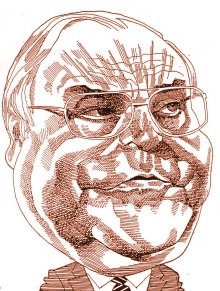|
|

Jewish World Review / May 21, 1998 / 25 Iyar, 5758
Roger Simon
LONDON -- Every day Pakistan doesn't set off a nuclear blast is a good day for Bill Clinton,
but as he jetted back to Washington this week to face reality after a week-long European
jaunt, there was a simple question left behind:
What did he accomplish?
He went to Germany to celebrate the 50th anniversary of the Berlin airlift, but it was a
particularly lifeless event with bad TV pictures for a White House that is obsessed with how
things look on the screen.
Clinton's visit was supposed to boost the sagging hopes of German Chancellor Helmut
Kohl, who is struggling to get elected to a fifth term, but even though Clinton made a series
of thinly disguised campaign appearances on his behalf, few think Kohl will be able to
convince German voters that a change is not needed.
Events in India, Pakistan, Indonesia and Kosovo overshadowed the economic summit that
Clinton attended in Birmingham. And at the end of his trip, as he jetted to Geneva to give a
speech on world trade, White House briefers finally sprang into action, revealing a new deal
that seems destined to mire the Clinton administration in international controversy.
In an attempt to mollify European nations that are furious with U.S. sanction laws, Clinton
has agreed to partially de-fang a federal law that punishes companies that utilize property
seized by the Cuban government of Fidel Castro.
In return, the 15 countries of the European Union have promised to discourage such
practices in the future.
Also, the United States has agreed to waive sanctions against three European companies
that are pouring $2 billion into Iran -- in return for a Russian promise to help control
worldwide terrorism and the spread of weapons of mass destruction.
Toning down the Cuban sanctions law, known as the Helms-Burton Act, will require
congressional approval, which the White House says is likely, but those on Capitol Hill are
less sure of.
Granting waivers to companies that are doing business with Iran and Libya under the
so-called D'Amato Act does not require such approval.
Ironically, Clinton's speech was attended by Cuban President Fidel Castro, who politely
applauded from the front row after Clinton finished. Clinton did not speak about the Cuban
sanctions, however, and left the chamber immediately after his speech. The two leaders
did not greet one another.
At the airport in Geneva, a Cuban airliner was parked adjacent to Air Force One on the
tarmac.
The European Union has strongly opposed U.S. sanction laws, which they consider illegal
under world trade agreements, and has threatened both to sue the United States and
sanction U.S. companies in retaliation.
"We have now avoided a major conflict with Europe," said one senior administration official.
The Helms-Burton act, sponsored by Sen. Jesse Helms, R-N.C., and Rep. Dan Burton,
R-Ind., was passed in March 1996 after a Cuban MiG shot down an unarmed U.S. plane
carrying Cuban Americans.
The purpose of the bill was to deter companies from investing in expropriated property.
There have been more than 6,000 claims, mainly by former Cuban nationals who are now
U.S. citizens, against the Castro government for seizing such property.
There are two chief sanctions under the act. In one, corporate officials from companies
investing in such property and their spouses and children are forbidden to enter the United
States.
This sanction, called Title IV, has aroused the most anger from foreign governments, even
though it has been invoked only once to deny entry to a Canadian executive and his family.
"It's a pride thing," one White House official said.
Title IV is the part of the Helms-Burton act that the Clinton administration will ask Congress
to waive as it applies to corporations in European Union countries.
Title III, under which U.S. citizens can sue foreign companies that use their seized property
will remain in effect, though Clinton retains the right to grant limited waivers.
In return, the nations of the European Union will agree to police their own corporations,
denying them loans, grants, subsidies, political risk insurance and government investment if
they use improperly seized property.
"This will chill investments in Cuba in the greatest way since Castro came to power," one
administration official told reporters and predicted that Cuba would lose huge sums of
money because of it.
The waivers to the D'Amato Act, formally known as the Iran-Libya Sanctions Act, also
passed in 1996, present a knottier problem for the White House since the compromise
basically acknowledges that Iran will be enriched by $2 billion provided by Russian, French
and Malaysian companies that are developing an Iranian oil field.
The White House still disapproves of the investment but will waive sanctions against the
three companies in return for a Russian agreement to control the transfer of missile
technology, high-tech equipment and software to parties that may engage in terrorism or
construct weapons of mass destruction.
"I want to emphasize that our position on Iran has not changed," Secretary of State
Madeleine Albright said London this week. "We will continue to press for enhanced
international cooperation to counter Iran's efforts to acquire weapons of mass destruction
and their delivery systems, and its support for terrorism."
Secretary Albright said she was granting waivers to the three foreign companies because
"waivers will enhance our ability to work with the Europeans, Russia and Malaysia on a host
of other bilateral and multilateral concerns."
Among the things that the waivers might make possible, she said, was Russian ratification
of the START II nuclear weapons reduction treaty, "the isolation of Saddam Hussein,"
cooperation in resolving the Asian financial crisis and cooperation in resolving "the rapidly
unfolding events in Indonesia."
In reality, however, the Russian parliament remains opposed to START II, the Asian
financial crisis remains unresolved, and if Suharto does step down in Indonesia, it won't be
because the Clinton administration had much to do with
 Buba is back from Europe ... but what did he accomplish?
Buba is back from Europe ... but what did he accomplish?

5/18/98Roses for Buba
5/12/98:Just who is "Mr. Republican" these days?"
5/7/98:"Why Clinton keeeps "going and going and going""
5/1/98:"Bubba v. Tabacka"
4/29/98:"You may ask, but should they tell?"
4/24/98:"McCurry and the kids from the ‘hood "
4/23/98: "NOW" should change its name to "THEN"
4/20/98: Freedom to be a jerk?
4/14/98: Bill is Hef's kinda guy
4/7/98: South African memories --- and a paradise not yet found
3/24/98: Bill's 12-day safari
3/20/98: Peace for Ireland?
3/18/98: Flat tire? Spare me
3/13/98: Latrell Sprewell's genius
3/10/98: On truth and reality
3/5/98: No, I'm not harrassing Hillary
3/3/98: The Unforgettable Henny Youngman
2/26/98: Grow up, boys!
2/24/98: Go get 'em, Bill!
2/19/98: My 15 minutes
2/17/98: The manic-depressive presidency
2/12/98: Drip, Drip, Drip
2/10/98: Clinton tunes out the networks
2/5/98: The flight of the Beast: America's love-hate relationship with scandal
2/3/98: Speaking Clintonese
1/29/98: What the president has going for him
1/27/98: Judgment call: how Americans view President Clinton
1/22/98: Bimbo eruptions past and present
1/20/98: Feeding the beast: Paula Jones gets the full O.J.
1/15/98: Let's get it over with: it's time to deal with Saddam, already
1/13/98: Sonny Bono is dead, let the good times roll
1/8/98: Carribbean Cheesecake: First couple has cake, eats cake
1/6/98: PO'ed: a suspected druggie jumps through the employment hoops
1/1/98: Cures for that holiday hangover
12/30/97: Buy stuff now
12/25/97: Peace to all squirrelkind
12/23/97: Home for the Holidays: Where John Hinckley, never convicted, will not be
12/18/97: Bill's B-list Bacchanalia: Press and politicos get cozy, to a point
12/16/97: All dressed up... (White House flack Mike McCurry speculates on his next career)